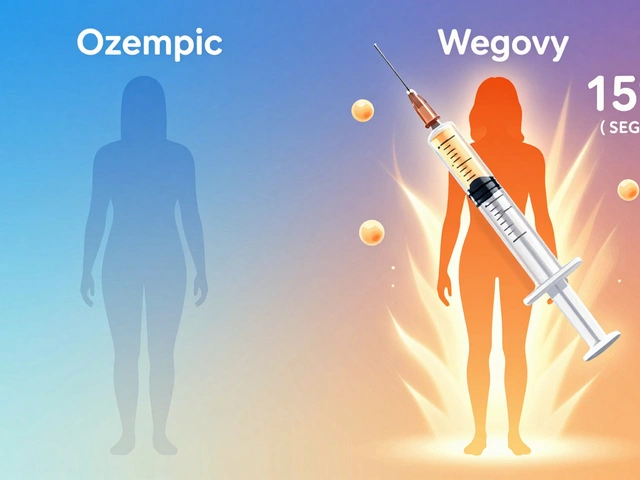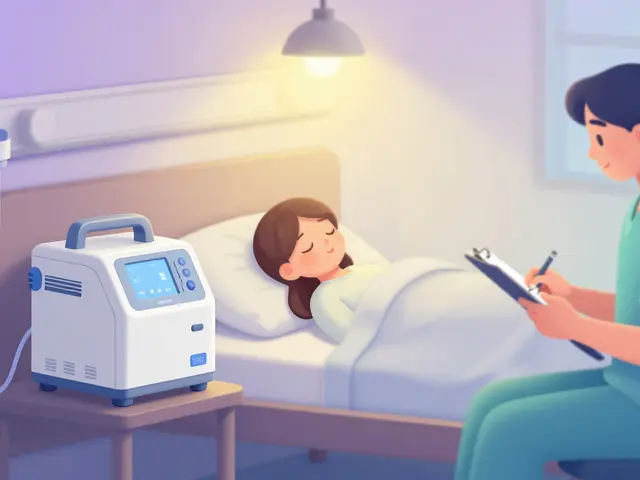Semaglutide for Weight Loss: How Ozempic and Wegovy Compare in Real-World Efficacy
December 8 2025Graves' disease: what to expect and what to do
Graves' disease is an autoimmune condition that makes your thyroid overactive. That can speed up your heart, make you lose weight, cause sweaty palms, and sometimes change your eyes or skin. If you’re seeing rapid heartbeat, shaking, unexplained weight loss, or bulging eyes, don’t ignore it — these are signs to get checked.
Common symptoms and how it’s diagnosed
Symptoms often include anxiety, trouble sleeping, heat intolerance, frequent bowel movements, and irregular periods. Eyes can feel gritty, look puffy, or bulge (Graves' ophthalmopathy). Doctors start with blood tests: TSH (usually very low), and free T4 and free T3 (usually high). Your clinician may also order thyroid-stimulating immunoglobulins (TSI) to confirm Graves'.
Imaging like an ultrasound or radioactive iodine uptake can help in tricky cases. If your eyes are affected, an eye specialist (ophthalmologist) will check vision, eye movement, and signs of inflammation. Early testing speeds up the right treatment.
Treatment options and practical tips
Treatment aims to control thyroid hormone and protect your eyes. Common options are:
- Anti-thyroid drugs: Methimazole is the usual first choice. Propylthiouracil (PTU) is used in early pregnancy. These drugs can work well, but watch for rare side effects like fever, sore throat, or yellowing skin—report those right away (agranulocytosis and liver problems are rare but serious).
- Beta-blockers: Drugs like propranolol help with fast heart rate, tremor, and anxiety while other treatments take effect. They don’t fix the thyroid problem but make you feel better fast.
- Radioactive iodine: This often works to stop the overactive thyroid but commonly leads to underactive thyroid later. If that happens, you’ll need lifelong levothyroxine (Synthroid) replacement.
- Surgery (thyroidectomy): Used when medication or radioactive iodine aren’t suitable, or when there’s a large goiter. Surgery also typically leads to needing thyroid hormone replacement.
For eye problems, steroids, local treatments, or surgery may be needed. Smoking makes eye disease worse, so quitting greatly helps outcomes.
Practical checklist: get baseline blood tests, see an endocrinologist if possible, avoid iodine supplements and high-iodine foods (like kelp) while being evaluated, and report fever or sore throat during anti-thyroid treatment. If you take medicines, keep regular lab follow-up to adjust doses and catch side effects early.
If you’re considering buying medication online, use licensed pharmacies that require a prescription and show clear contact info. When in doubt, ask your doctor first. With the right care and monitoring, Graves' disease is manageable — get checked, stay informed, and follow up regularly.
 12 Jul
12 Jul
Navigating Relationships with Graves' Disease: Tips and Advice
Navigating relationships while dealing with Graves' Disease can be challenging, but not impossible. The blog post provides helpful tips that focus on open communication, understanding, and patience. It highlights the importance of educating loved ones about the disease to help them comprehend the physical and emotional changes it brings. The advice shared emphasizes on self-care, setting boundaries, and seeking professional help if needed. Lastly, it encourages individuals to remain hopeful and positive even in the midst of adversity.
Read More...



